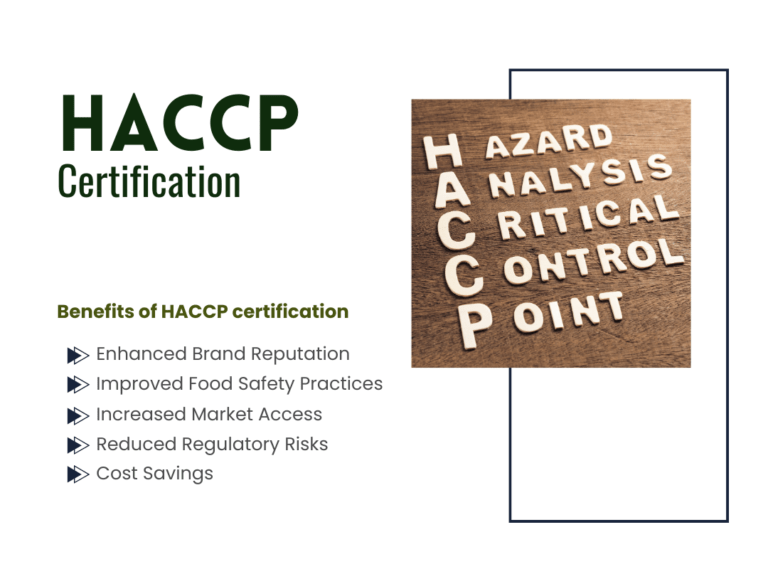HACCP Certification
- Home
- HACCP Certification
Hazard Analysis and Critical Control Points (HACCP) certification is a systematic approach to food safety management that identifies, evaluates, and controls hazards throughout the food production process. It involves a rigorous assessment of potential hazards, from raw material sourcing to final consumption, to ensure the production of safe and high-quality food products.
The purpose of HACCP certification is to prevent hazards such as biological, chemical, and physical contaminants that could pose health risks to consumers. By implementing HACCP principles, organizations can demonstrate their commitment to food safety, meet regulatory requirements, and enhance consumer trust in their products.

Benefits of HACCP certification
Hazard Analysis and Critical Control Points (HACCP) certification offers a multitude of advantages to food businesses, ensuring their products meet the highest standards of safety and quality. Here’s a breakdown of its benefits:
Enhanced Brand Reputation: HACCP certification signifies a commitment to food safety and quality, bolstering consumer trust and confidence in your brand. Customers are more likely to choose products bearing this certification, knowing they adhere to rigorous safety protocols.
Improved Food Safety Practices: Implementing HACCP principles involves a systematic approach to identifying and controlling food safety hazards at critical points in the production process. This proactive approach minimizes risks of contamination, pathogens, and other hazards, ensuring the production of safe and wholesome food products.
Increased Market Access: Many retailers, distributors, and consumers require HACCP certification as a prerequisite for doing business. Attaining this certification expands market opportunities and facilitates entry into new markets, both domestically and internationally.
Reduced Regulatory Risks: Compliance with HACCP standards aligns with regulatory requirements set forth by government agencies overseeing food safety. By adhering to these standards, businesses mitigate the risk of fines, penalties, or legal consequences associated with non-compliance.
Cost Savings through Fewer Recalls and Spoilage: Implementing HACCP protocols can lead to significant cost savings by reducing the likelihood of product recalls due to contamination or safety concerns. Moreover, enhanced control measures minimize food spoilage, optimizing production efficiency and reducing waste.
In summary, HACCP certification offers a comprehensive framework for ensuring food safety, which translates into tangible benefits for businesses, including strengthened brand reputation, improved operational efficiency, and increased market opportunities. By prioritizing safety and quality through HACCP, food businesses can secure a competitive edge in the marketplace while safeguarding public health.
In conclusion, HACCP certification empowers your food business to prioritize safety, build consumer trust, and navigate the ever-evolving regulatory landscape. By implementing this internationally recognized standard, you demonstrate a proactive approach to hazard analysis, control, and prevention. This not only protects your customers and brand reputation but also opens doors to new markets and opportunities. Whether you’re a seasoned food professional or just starting your journey, HACCP certification can be a valuable asset, ensuring your food is safe, delicious, and enjoyed with confidence. Take the first step towards a safer future for your business and your customers – explore HACCP certification today.
